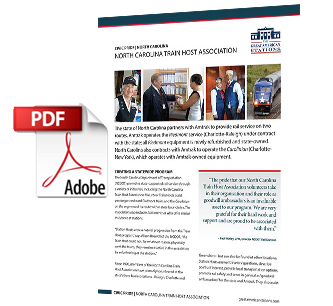As of early 2016, there were 120 North Carolina Train Hosts. Approximately 15 of those volunteers worked primarily in stations. Paul Worley, CPM, director of the NCDOT Rail Division, notes, “In 2015, association members contributed more than 13,100 hours aboard the trains and in the stations throughout North Carolina.”
Host Training

Stations hosts wear distinctive uniforms
New train hosts fill out an application and must pass a background check. Once they are approved to move forward, they attend a day of training in Raleigh sponsored by the NCDOT. Classes are held two or three times a year depending on the number of applications received. Hosts board actual Piedmont equipment to get a feel for the train; review schedules and rail safety standards; and discuss rules for working with Amtrak personnel and interacting with passengers.
Once they have completed an in-station training period, station hosts must commit to two hosting days every 30 days. They are generally in the station for about an hour before and after a train’s departure. In addition to the duties mentioned above, station hosts may assist passengers with disabilities as requested by NCDOT or Amtrak personnel, but they do not handle baggage.
Hosts are asked to present a neat and uniformed appearance while on duty. Men wear a suit or sport coat and slacks, shirt of any color, a vest and a necktie, while women may wear a skirt or pants, a blouse of any color, a vest and a scarf. Volunteers must also wear an ID badge so that they are easily identified by passengers and station staff. The NCDOT and Train Host Association provide the vests, neckties, scarves, hats, visors and ID badges.
Station Host Coordinators

Station hosts provide customers with information on travel services and local attractions.
There is a station host coordinator each for the Raleigh, Charlotte and Greensboro stations. They arrange for station hosts to be present during especially busy days, whether to assist a large tour group coming through the station, facilitate holiday travel, or help during high ridership events such as a Carolina Panthers game.
Bill Cole, the station host coordinator based in Charlotte, has volunteered with the program for 25 years. In that time, he has developed his own host philosophy that he shares with new volunteers:
I focus on four components of every trip:
- The ticket purchase – was it problem-free?
- In the station – was it a welcoming, helpful and comfortable environment?
- The on board experience – were you pleased? Would you ride again? (The host’s job is to help this happen).
- Assist in smooth and efficient de-training and baggage pickup, directions to taxis, buses, etc.
The station host coordinators work with new volunteers to discuss their areas of interest, introduce them to the NCDOT Station Attendants or Amtrak agents, provide contact information for local transportation providers and highlight restaurants, shopping areas and other attractions in the community.
Thanks to Alison Boswell of the NCDOT for her assistance with this profile. Station and train host photos by Katy Warner, NCDOT Staff Photographer.







 Amtrak established the Great American Stations Project in 2006 to educate communities on the benefits of redeveloping train stations, offer tools to community leaders to preserve their stations, and provide the appropriate Amtrak resources.
Amtrak established the Great American Stations Project in 2006 to educate communities on the benefits of redeveloping train stations, offer tools to community leaders to preserve their stations, and provide the appropriate Amtrak resources. Amtrak is seizing a once-in-a-lifetime opportunity to transform rail and Retrain Travel. By modernizing, enhancing and expanding trains, stations and infrastructure, Amtrak is meeting the rising demand for train travel. Amtrak offers unforgettable experiences to more than 500 destinations across 46 states and parts of Canada. Learn more at
Amtrak is seizing a once-in-a-lifetime opportunity to transform rail and Retrain Travel. By modernizing, enhancing and expanding trains, stations and infrastructure, Amtrak is meeting the rising demand for train travel. Amtrak offers unforgettable experiences to more than 500 destinations across 46 states and parts of Canada. Learn more at